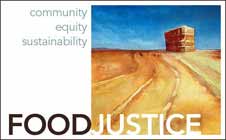For 4 days in February of 2011, the University of Oregon’s Food Justice conference drew leaders together from the sustainability movement, farmers, scholars, educators, students, and others to examine the food system through the lens of community, equity, and sustainability concerns.
In the video from this panel discussion, Keynote Roundtable: Food Justice & Farm Advocacy in the U.S., three of the panelist’s below share their views on what food justice means to them:
* shown in the video
* Rachel Bristol, CEO, Oregon Food Bank
Deb Johnson-Shelton, President, Lane County (Oregon) Food Policy Council
* Young Kim, Executive Director, Fondy Food Center, Milwaukee
Tammy Morales, Principal, Urban Food Link
* Chris Schreiner, Executive Director, Oregon Tilth
Cynthia Torres, Director, Colorado Farmers Market Association
Moderator: Naomi Starkman, Co-founder of Civil Eats
Editorial
Why a quest for food justice? Does the food system require its own particular flavor of justice outside of the wider society? After all, if there is adequate justice in the world, wouldn’t that cover this sector equally as well? Or conversely, if justice is lacking in society as a whole, how then do we expect to make things right in one particular realm, but not the whole?
That is the conundrum at hand. For although food justice is a particular challenge within the agricultural system, (social, economic, and political) injustice are inextricably woven into the fabric of our society at large. The struggles of the working class (also now increasingly for those in the middle class too) must confront a host of common challenges including affordable access to healthcare, food insecurity, availability of livable wage jobs, systemic bias and discrimination toward the poor; and an increasing political tolerance for the acceptance of historically high levels of inequality in America.
Rising inequality feeds on itself, tipping the scales ever further away from the creation of a just society, food justice lies captive, rotting in the dormant social wind.
Most of the videos featured on Cooking Up a Story were produced, filmed, and edited by Rebecca Gerendasy. Fred Gerendasy contributed as a writer to many of the posts and occasionally as the interviewer. Visit Rebecca Gerendasy Clay – Art and Fred Gerendasy Photography to see their current work.

